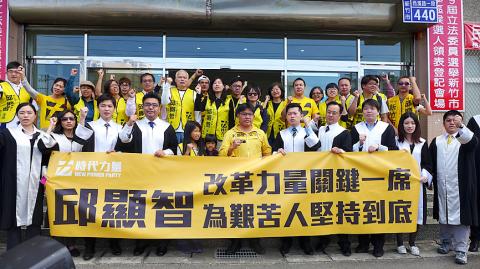New Power Party (NPP) legislative candidate Chiu Hsien-chih (邱顯智) yesterday registered his candidacy for the Hsinchu district seat, following the failure of efforts to “integrate” with Democratic Progressive Party (DPP) Legislator Ker Chien-ming (柯建銘).
“We showed a huge amount of good faith by putting out the possibility of integration polls, but that was not something we could make happen on our own,” Chiu said. “Prior to the official registration, there was always a possibility of using polls to integrate, but that possibility fell apart after [Ker] registered on Monday.”
“Integration” refers to an ad hoc primary process under which competing candidates agree to withdraw from the race and support whoever ranks highest in a negotiated set of surveys.

Photo: Wang Chun-chieh, Taipei Times
Ker last week was quoted in the Chinese-language media as saying that integration was a “fake issue” used for “electoral manipulation.”
“We will keep moving forward on our set course,” Chiu said, adding that while reform of the Legislative Yuan will remain one of the pillars of his campaign, his focus would be on the system, not Ker’s role as the DPP caucus whip.
Chiu has been critical of role that cross-party negotiations — often conducted behind closed doors — play in the passage of legislation, while Ker has said that such discussions are a necessary measure to solve deadlocks on the legislative floor.
Ker yesterday dismissed concerns that having two pan-green candidates in the race would deliver a victory to Chinese Nationalist Party (KMT) candidate Cheng Cheng-chien (鄭正鈐), citing last year’s Hsinchu mayoral election that saw DPP candidate Lin Chih-chien (林智堅) elected even though former DPP mayor Tsai Jen-chien (蔡仁堅) ran as an independent in the race.
Hsinchu is now the sole legislative district to have both a DPP and a NPP candidate in the Jan. 16 presidential and legislative elections, as the parties were able to coordinate on the nominations for most of the other district seats where there was an overlap.

Three Taiwanese airlines have prohibited passengers from packing Bluetooth earbuds and their charger cases in checked luggage. EVA Air and Uni Air said that Bluetooth earbuds and charger cases are categorized as portable electronic devices, which should be switched off if they are placed in checked luggage based on international aviation safety regulations. They must not be in standby or sleep mode. However, as charging would continue when earbuds are placed in the charger cases, which would contravene international aviation regulations, their cases must be carried as hand luggage, they said. Tigerair Taiwan said that earbud charger cases are equipped

Foreign travelers entering Taiwan on a short layover via Taiwan Taoyuan International Airport are receiving NT$600 gift vouchers from yesterday, the Tourism Administration said, adding that it hopes the incentive would boost tourism consumption at the airport. The program, which allows travelers holding non-Taiwan passports who enter the country during a layover of up to 24 hours to claim a voucher, aims to promote attractions at the airport, the agency said in a statement on Friday. To participate, travelers must sign up on the campaign Web site, the agency said. They can then present their passport and boarding pass for their connecting international

UNILATERAL MOVES: Officials have raised concerns that Beijing could try to exert economic control over Kinmen in a key development plan next year The Civil Aviation Administration (CAA) yesterday said that China has so far failed to provide any information about a new airport expected to open next year that is less than 10km from a Taiwanese airport, raising flight safety concerns. Xiamen Xiangan International Airport is only about 3km at its closest point from the islands in Kinmen County — the scene of on-off fighting during the Cold War — and construction work can be seen and heard clearly from the Taiwan side. In a written statement sent to Reuters, the CAA said that airports close to each other need detailed advanced

Tropical Storm Fung-Wong would likely strengthen into a typhoon later today as it continues moving westward across the Pacific before heading in Taiwan’s direction next week, the Central Weather Administration (CWA) said. As of 8am, Fung-Wong was about 2,190km east-southeast of Cape Oluanpi (鵝鑾鼻), Taiwan’s southernmost point, moving westward at 25kph and possibly accelerating to 31kph, CWA data showed. The tropical storm is currently over waters east of the Philippines and still far from Taiwan, CWA forecaster Tseng Chao-cheng (曾昭誠) said, adding that it could likely strengthen into a typhoon later in the day. It is forecast to reach the South China Sea